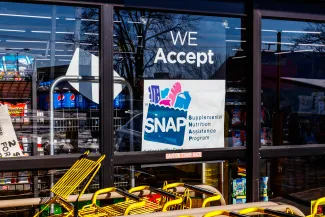
Trump administration blocked from cutting off SNAP benefits as two judges issue orders
A federal judge in Boston ruled Friday that the U.S. Department of Agriculture’s plan to pause a food assistance program for 42 million people was illegal — but gave the Trump administration until Monday to respond to her finding before she decides on a motion to force the benefits be paid despite the ongoing government shutdown.
At nearly the same time Friday, a Rhode Island federal judge in a similar case brought by cities and nonprofit groups ordered USDA to continue payments and granted a request for a temporary restraining order.

In Massachusetts, in a Friday afternoon order, District Court of Massachusetts Judge Indira Talwani said she would continue to take “under advisement” a coalition of Democratic states’ request to force the release of funds from a contingency account holding about $6 billion.
Her ruling came a day before a cutoff of Supplemental Nutrition Assistance Program, or SNAP, benefits to low-income households.
Because Congress is locked in a stalemate over a stopgap spending bill and did not appropriate money for the fiscal year that began Oct. 1, administration officials say the program cannot provide federal funds beginning Saturday. In states, SNAP benefits are loaded onto cards on varying dates, but the cutoff would be effective for November benefits.
Talwani, who was appointed by former President Barack Obama, called the administration’s conclusion it can’t provide SNAP funding “erroneous,” and said the reserve fund was sufficient for SNAP benefits to flow to states and the vendors that add money to debit-like cards issued to the program’s beneficiaries that are used to purchase groceries.
The law creating the program mandated that benefits continue, she said.
“Defendants are statutorily mandated to use the previously appropriated SNAP contingency reserve when necessary and also have discretion to use other previously appropriated funds,” Talwani wrote.

© Pixabay - skeeze
Talwani ordered the administration to say by Monday whether it would provide at least partial benefits for November.
The 25 states that sued were Massachusetts, California, Arizona, Minnesota, Connecticut, Colorado, Delaware, Hawaii, Illinois, Maine, Maryland, Michigan, Nevada, New Jersey, New Mexico, New York, North Carolina, Oregon, Rhode Island, Vermont, Washington state, Wisconsin Kansas, Kentucky and Pennsylvania. The District of Columbia also sued.
In Rhode Island, where the judge granted a temporary restraining order, the advocacy group Democracy Forward, which was among those bringing the suit, praised the move.
“A federal court today granted a temporary restraining order blocking the Trump-Vance administration’s unlawful effort to halt the Supplemental Nutrition Assistance Program (SNAP) during the ongoing government shutdown,” the group said.” The decision ensures that millions of children, seniors, veterans, and families will continue to receive essential food assistance while the case proceeds.”
The judge in that case, John James McConnell Jr., said the administration’s actions violated a key federal administrative law against arbitrary and capricious executive action and federal spending laws “by disregarding Congress’s direction that SNAP must continue operating,” Democracy Forward said.
McConnell also was appointed by Obama.
Shauneen Miranda contributed to this report.














